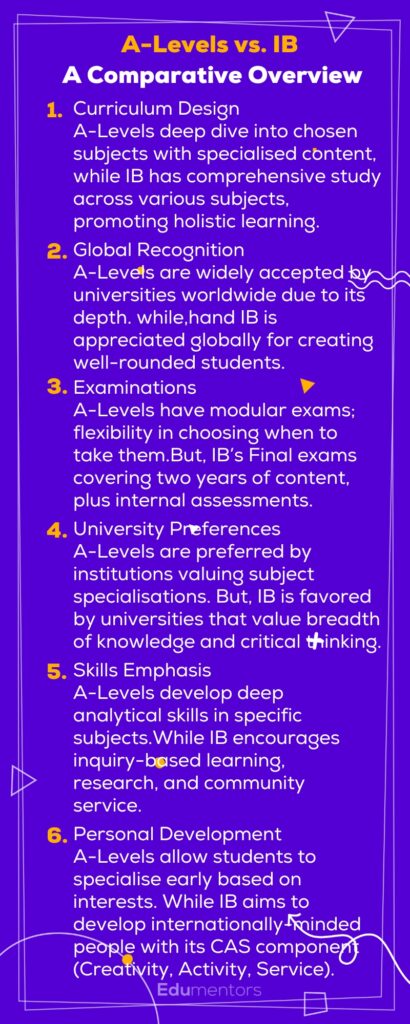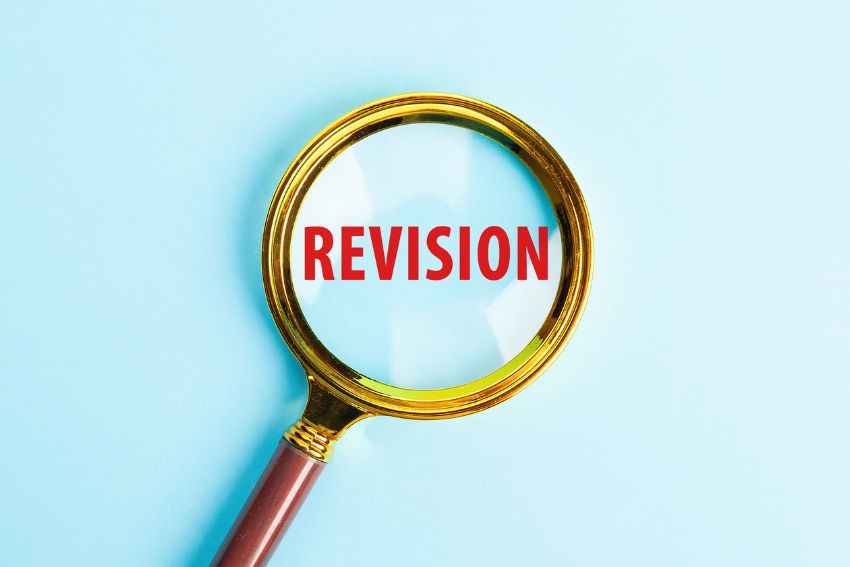A Level vs. IB – Which One Should You Choose?
Hello, future scholars, If you’re neck-deep in the whirlpool of high school decisions, you’re likely facing the big one: A-Levels or IB? This decision can be as critical as choosing a university, affecting everything from your university applications to career pathways. So, whether you’re wondering about the intricacies of IB exams in sixth form or curious about how A-Levels can prepare you for that medical degree, this blog is your one-stop shop for answers. 🛑✅
You might be asking, Does Harvard prefer IB or A-Levels?, Is A-Level higher than IB? even, what is the hardest IB exam? Don’t worry, we’ve got you covered! Many students who reach this decision point have completed GCSEs or IGCSEs, the international equivalent of GCSEs, and are now considering whether A-Levels or IB better suit their future goals. To make an informed choice, understanding IB Diploma Programme requirements is essential before committing to this rigorous educational path. It’s worth noting that the UK’s educational landscape is evolving. The proposed Advanced British Standard aims to merge A-levels and T-levels into a unified qualification, potentially impacting future choices for students. For more details on this development, refer to our article on the Advanced British Standard.
This blog will not only answer those burning questions but also shed light on what really prepares you for university and, yes, life itself! And remember, whichever path you choose, it all culminates in that nerve-wracking IB results day for IB students – a day that marks the transition from high school to whatever exciting future lies ahead. Ready to make the most informed decision of your academic life?!

Deciphering the Curriculum 📖
Ready to dive into the nitty-gritty details? If you’re still on the fence about which curriculum to choose, understanding the structure and content of each is a game-changer. In this section, we’ll unravel the intricacies of IB exams and demystify A-Level examinations, answering pressing questions like Is A-Level higher than IB? and What are IB exams in high school? Let’s get to it! 💡

The Intricacies of IB Exams 🌍
What are IB exams in high school? The International Baccalaureate (IB) is like the Swiss Army knife of curricula, it’s got a little bit of everything. The program includes six subject groups: Language and Literature, Language Acquisition, Individuals and Societies, Sciences, Mathematics, and the Arts. This holistic approach could be one reason some consider IB to be more difficult.
The burning question often is, What is the hardest IB exam? The answer varies because the IB challenges you in a variety of subjects. It’s not just about book smarts; it also tests your critical thinking and world awareness.
So, what truly sets the IB curriculum apart from A-Levels? The answer lies in its three core elements: Theory of Knowledge (ToK), Extended Essay (EE), and Creativity, Activity, Service (CAS). These aren’t just fancy acronyms; they’re designed to make you think differently and challenge your approach to learning.💡
ToK
Theory of Knowledge (ToK) is more than just a class; it’s a deep dive into the very nature of knowledge itself. 🤯
EE
Extended Essay (EE) is your chance to become a mini-expert in a subject you’re passionate about. Picture a mini-thesis, but in high school. 📝
CAS
Creativity, Activity, Service (CAS) ensures you’re not just a bookworm but a well-rounded individual. 🎭🏀🌱
For those of you wondering whether universities prefer A-Levels or IB, these unique core elements can give you an edge. Especially if you’re aiming for top universities that appreciate a well-rounded educational background, the IB has the potential to make you stand out. 🌟
A-Level Examinations Explained
Now, A-Levels. What are they all about? Originating from the UK, A-Levels allow you to specialise in a handful of subjects, typically three or four. And speaking of specialisation, if you’re aiming for something like medicine, many would argue that A-Levels provide the depth needed for such specialised fields.
The latest educational reforms have changed the structure of A-Levels significantly. Gone are the days of A/S levels contributing to the final grade; now all A-Level exams occur at the end of Year 13. Many students wonder about the difficulty of A-Levels vs IB, and the answer, again, is dependent on individual strengths and career objectives.
One critical consideration here is A-Levels vs IB difficulty. The recent reforms in A-Level curricula have made them even more challenging, reducing coursework and putting greater emphasis on exams. 📝 This makes A-Levels a better choice for those who excel in test-taking scenarios.
So, when it comes to the weighty question of whether universities prefer A-Levels or IB, the answer isn’t so straightforward. While A Levels and IB are two popular options, there are many other educational pathways available to students looking beyond traditional qualifications. They offer paths to success, depending on what you’re looking to get out of your high school experience. 🎓
A-levels vs IB: Pros and Cons
Choosing between IB and A-Levels is a complex decision, with various pros and cons to weigh up. You might be wondering, What is the IB score equivalent to A-Levels? or Is A-Level higher than IB? or even Do universities prefer A-Levels or IB? To answer these questions, let’s delve into the advantages and disadvantages of both educational pathways.
A-Levels
✅ Pros
Specialisation: A-Levels enable you to focus on three to four subjects, allowing you to dive deep into your chosen fields.
Flexibility: Multiple exam dates offer you flexibility to retake exams if needed, catering to different learning paces.
Global Acceptance: A-Levels are accepted by universities around the world, including Ivy League colleges in the U.S. and Oxbridge in the UK.
❌ Cons
Limited Breadth: This focus on depth over breadth means you might miss out on a well-rounded education.
Local Flavour: While globally recognised, A-Levels are primarily UK-centric, which might not offer a global perspective.
Pressure: With recent reforms making exams more challenging, the stakes are higher than ever.
IB Diploma
✅ Pros
Holistic Curriculum: From arts to sciences, the IB covers it all. It even includes core elements like ToK, EE, and CAS to develop you into a well-rounded individual.
International Outlook: The IB’s global focus prepares you for university rigour and fosters a global mindset.
University Preparation: According to a 2022 University Admissions Officers Report, IB students often have an edge when it comes to university and workplace preparedness. 🎓
❌ Cons
Heavy Workload: With six subjects and core elements, the IB can be intense.
Less Flexibility: One set of final exams and stringent internal assessments mean less wiggle room.
Limited Specialisation: Because of its breadth, the IB might not offer the same depth in specialised subjects, which could be a downside for fields like medicine.
IB vs A-Levels – What Do Universities Really Think? 🏛️
One of the most pressing questions you may have right now is, How do top universities rate IB and A-Levels? After all, your end game might be landing a coveted spot in institutions like Harvard or Oxford. Do these universities have a preference between IB and A-Levels? Let’s dig deep into what the admission officers and data say, and solve queries like Does Harvard prefer IB or A-Levels? or Is IB or A-Levels better for medicine?
Insights from the 2022 University Admissions Officers Report and other Studies 📊
The University Admissions Officers Report of 2022, along with various other studies, offers illuminating data that can help settle the age-old debate: Do universities prefer A-Levels or IB?
According to the 2022 report, 74% of admissions officers believe that the IB diploma prepares students effectively for university, as compared to 56% for A-Levels. This isn’t just about being university-ready; it’s also about being equipped for the demands of the modern workplace. IB students are lauded for their critical thinking skills, a cornerstone of the Theory of Knowledge (ToK) component in the IB curriculum.
But don’t count A-Levels out! The report also highlights that A-Level students bring specialised knowledge to the table, a result of the depth-over-breadth approach of the A-Level curriculum. This makes A-Level students particularly attractive for courses that require a strong background in specific subjects, like medicine or engineering.
Interestingly, 63% of university admissions officers stated that A-Level students are good at independent inquiry, a skill honed by the recent reforms that emphasise end-of-year exams over continuous assessment. On the other hand, the IB’s focus on long-term projects and internal assessments, comprising 15-25% of the final score, makes 78% of admissions officers confident in an IB student’s ability to manage long-term projects.
So, the next time you ponder questions like, What is a 6 in IB equivalent to in A-Levels? or Is A-Level higher than IB? Consider the qualities and skills that universities value in their incoming students. 💡

Harvard, Oxford, and Other Top-Tier Universities’ Perspectives on A-Levels vs. IB
So, wondering about questions like Does Harvard prefer IB or A-Levels? or Does Oxford prefer IB or A-Levels? The answers aren’t always clear-cut. Every elite university has its unique selection criteria, and while your exam pathway might make a difference, it’s not the only factor.
How Personal Tutors Can Boost Your University Chances
Here’s where specialised guidance can make all the difference: Consider tapping into the expertise of personal tutors from platforms like Edumentors. Not only can they help you prepare for these challenging exams, whether you’re diving into the intricacies of IB exams or mastering the depths of A-Level subjects, they also offer invaluable insights into applying for top-tier universities like Harvard and Oxford.
Why? Because these tutors are often graduates from these very institutions and understand the ins and outs of what it takes to get admitted. They can offer you specialised strategies, from acing your exams to tailoring your application to catch the eye of admissions officers. So, you’re not just preparing for exams; you’re setting the stage for your dream university.
A-Levels vs IB: What Harvard and Oxford Really Think
Harvard University has expressed a preference for the specialised knowledge that A-Levels offer. In fact, a higher percentage of A-Level students are found in specialised courses such as law and medicine at Harvard. 🎓📘 But Harvard isn’t the end-all, other U.S. universities show a broad acceptance of both educational pathways.
Now, cross the pond to the UK. Oxford University leans favourably towards the holistic educational approach of IB. They appreciate the global outlook, critical thinking, and the academic rigour that IB imparts to its students. 🌍📚 Interestingly, Oxford has mentioned that an IB score of 38 points out of a maximum of 45 is equivalent to five 8-9 grades at A-Level, shedding light on the question, What is the IB score equivalent to A-Level?
So, elite universities worldwide recognise both A-Levels and IB but for different strengths and skills. When choosing between IB or A-Levels for Oxbridge or Ivy League universities, consider the nuances each curriculum brings to the table. 🎭
A Look at Acceptance Rates: Is IB or A-Levels a Better Ticket to Top Universities? 🎟️
This might be your million-dollar question: Is A-Level higher than IB when it comes to acceptance rates at top universities?
Recent statistics provide some eye-opening answers. A study found that 17% more IB students gained admission into the top 20 UK universities compared to their A-Level peers. On the flip side, A-Level students still hold a high rate of acceptance, especially in specialised courses like medicine.
Let’s not forget the global perspective! IB has international recognition, with nearly 90 countries acknowledging its value. So, if you’re aiming for universities in Canada, Australia, or Europe, the IB could be your passport to these international educational hubs.
Still, when considering options like medicine, engineering, or law, and wondering which path suits you best, it’s helpful to look at A Levels compared to other qualifications. A-Levels might be the better fit for students who prefer to focus deeply on a few subjects.
Specific Fields 🎯
Curious about how your choice between A-Levels and IB will fare in specialised fields like medicine, engineering, or the arts? You’re not alone! Many students ponder this question, particularly when they’re eyeing specific career paths.
Medical Schools View Towards IB vs A-Levels? 💉👨⚕️
Ah, the golden question for all aspiring doctors: Is IB or A-Levels better for medicine? While both curriculums are strong in their own right, each has unique offerings that medical schools find appealing.
A-Levels allow you to dive deep into the sciences. If you know you want to be a doctor, you can focus solely on Biology, Chemistry, and Physics. This specialised approach is often appreciated in UK medical schools, which have been traditionally geared towards early specialisation.
On the other hand, the IB curriculum’s broader approach means you’ll have a well-rounded education that includes humanities and languages, in addition to the sciences. 📚 Some medical schools appreciate this diversity, as medicine is not just about science but also about understanding people.
So, in summary, while A-Levels give you a chance to specialise early, IB offers a broader educational base that some medical schools find appealing. 🌡️
International University Preferences for IB and A-Levels 🌍🎓
Let’s go global! One of the questions often asked is, How do universities around the world view IB and A-Levels? or What are the IB exams in high school recognised internationally?
The A-Levels are a UK-origin qualification but are also recognised by universities globally, especially in Commonwealth countries. However, their reach may be a bit limited compared to the IB, which is recognised in nearly 90 countries.
For instance, if you’re targeting universities in the United States, the IB’s emphasis on a ‘global outlook’ and ‘critical thinking’ matches well with the liberal arts ethos of many American institutions.
Conversely, A-Levels are often aligned closely with British universities and those in countries with similar educational frameworks, like Australia and Singapore.
So, if you’re pondering questions like Does Harvard prefer IB or A-Levels? or What is a 6 in IB equivalent to in A-Levels?, remember that your university choices may influence which curriculum is best for you. It’s also important to consider where you’re starting from, whether that’s GCSEs and KS4 vocational qualifications, as these form the foundation of your academic journey and can shape future opportunities.
That wraps up our deeper look into specialised fields and the global preferences for IB and A-Levels. As you can see, the best choice varies depending on your specific goals and where in the world you aim to study. 🎓🌐
Conclusion
Wow, what a journey this has been, diving deep into the world of A-Levels IB! The road ahead is paved with academic rigour, lifelong learning, and countless opportunities for personal growth. 🌱 But guess what? No matter the pathway you choose, be it the specialised focus of A-Levels or the global education outlook of the IB, you’re destined for greatness if you put in the effort and passion. 🌟💪
Afraid of challenges? Don’t be. 🚫👊 Whether it’s tackling the hardest IB exams or navigating the complexities of A-Level subjects, remember: A smooth sea never made a skilled sailor. Your capabilities stretch far beyond what you might currently perceive. All you need to do is tap into that potential!
If you find yourself struggling to prepare for these challenging exams, remember, help is just a click away. A highly recommended tutoring platform can offer that extra push to get you across the finish line. They provide specialised tutoring for both A-Levels and IB, helping you conquer the exams and paving your way to your dream university! 🎉🏆
So go ahead, make your choice based on your personal aspirations, dive headfirst into your studies, and watch yourself soar higher than you ever dreamed possible. You’ve got this!🎓
FAQs About IB vs A-levels
Which is More Difficult, A-Levels or IB?
The difficulty level can vary based on your personal strengths, academic interests, and how you manage time. A-Levels allow deep dives into specific subjects, which can be intense if you choose challenging subjects like Further Mathematics or Physics. On the other hand, the IB curriculum requires a well-rounded approach, juggling six subjects along with core components like the Extended Essay and Theory of Knowledge. If you’re good at multitasking and enjoy a broad spectrum of subjects, you might find IB less challenging, and vice versa.
Do Universities Prefer A-Levels or IB?
This largely depends on the university and sometimes even the country where the university is located. In the UK, for instance, both A-Levels and IB are widely accepted and respected. In the United States, the IB is often seen as aligning well with the liberal arts educational philosophy. That said, top universities like Harvard or Oxford appreciate the merits of both. It’s less about Do universities prefer A-Levels or IB? and more about how well you perform in your chosen curriculum.
Is IB or A-Levels Better for Specialised Fields like Medicine, Engineering, or Law?
If you’re aiming for a specialised field like medicine, A-Levels allow you to focus intensively on science subjects, which can be an advantage. However, the IB’s broader curriculum can help build a more well-rounded profile, which some medical schools find attractive. For engineering or law, the choice might depend on whether you value a broad educational foundation (IB) or wish to specialise early (A-Levels).
What is the Equivalence Between IB scores and A-Level grades?
The equivalence isn’t straightforward because the grading scales are different. However, UCAS has a tariff system that helps compare IB scores with equivalent A-Level grades. For example, an IB score of 38 out of a maximum of 45 is roughly equivalent to five A grades at A-Level. This can be useful when you’re applying to universities that ask for certain grades or points.










